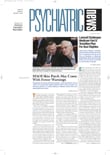An article in the September 2 issue reported on legislation that Congress had approved and the president had signed eliminating the restriction of 30 patients that group practices can treat at one time with buprenorphine. While this is welcome news, and doctors and patients alike appreciate the increased access to this remarkable new treatment option for opiate-dependent patients, it must be noted that there remains the 30-patient limit on individual doctors who prescribe this medication.
It is estimated that there are somewhere between 4,000 to 5,000 doctors actively prescribing buprenorphine, and even if all of them are treating 30 patients each (which they are not), this means that at most 150,000 patients are able to receive this treatment. It is more likely that between 50,000 to 75,000 patients are getting this treatment, but more than 1 million people are estimated to be opiate dependent in the United States (only a small number of these are receiving the other drug option, methadone).
I have been at my limit of 30 patients for more than 18 months and turn away at least five potential new patients each week. I also had a patient die from a heroin overdose while waiting for a treatment slot to open.
The experience in South Jersey and other places throughout the country is that there are clearly not enough buprenorphine-certified doctors willing and interested in treating these patients to even come close to meeting the need. Furthermore, it is ridiculous that the physicians who have the most experience with this treatment, those who offer the treatment the most and at the limit of 30 patients, are not able to utilize their expertise to treat more patients. In no other medical discipline are the most experienced physicians limited in treating patients. Would anybody go to a heart surgeon who only operated on 30 patients?
It is imperative that APA and the American Society of Addiction Medicine and other organizations work with congressional leaders to eliminate the 30-patient limit completely for all prescribers. I cannot think of any better way to address the drug problem than to increase access to treatment for all willing and interested patients. This approach to demand reduction will not even increase costs to the government, as patients will either use insurance or pay for it themselves. Buprenorphine, as a partial opiate agonist, essentially cannot be abused and has practically no euphoric effect. We must increase treatment availability—patients are dying needlessly.
